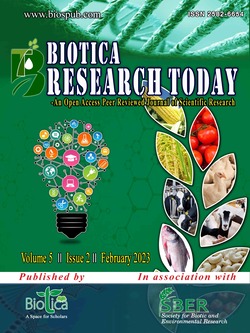
Biosafety Protocol: The Key Player in the Protection of Biological Integrity
Soumyabroto Karmakar
Dept. of Botany (Postgraduate), Ramakrishna Mission Vivekananda Centenary College, Rahara, Kolkata, West Bengal (700 118), India
Proharsha Dey
Dept. of Botany (Postgraduate), Ramakrishna Mission Vivekananda Centenary College, Rahara, Kolkata, West Bengal (700 118), India
Anirban Bhar*
Dept. of Botany (Postgraduate), Ramakrishna Mission Vivekananda Centenary College, Rahara, Kolkata, West Bengal (700 118), India
DOI: NIL
Keywords: Biosafety, Biotechnology, Crops, GMO
Abstract
Protection of biodiversity, food security, and prevention of infectious diseases are critical for the survivability of the human race. With the development of modern technologies, the society have been adopting higher-yield crops, the development of GMOs, advancement of critical medicines like antibiotics and vaccines with promises to make human life safer. Biosafety serves as a shield that monitors and makes sure that these modern scientific developments become harmless and do not cause any significant adverse effects on the environment or human life. In this article, biosafety and its essentiality have been discussed with an emphasis on the context of Genetically Modified Organisms (GMOs).
Downloads
not found
Reference
Bayot, M.L., Limaiem, F., 2022. Biosafety Guidelines. StatPearls Publishing Treasure Island (FL). Available at: https://www.ncbi.nlm.nih.gov/books/NBK537210/. Accessed on: 26th February, 2023.
Keese, P., 2008. Risks from GMOs due to horizontal gene transfer. Environmental Biosafety Research 7(3), 123-149. DOI: https://doi.org/10.1051/ebr:2008014.
Keswani, C., Prakash, O., Bharti, N., Vílchez, J.I., Sansinenea, E., Lally, R.D., Borriss, R., Singh, S.P., Gupta, V.K., Fraceto, L.F., de Lima, R., 2019. Re-addressing the biosafety issues of plant growth promoting rhizobacteria. Science of the Total Environment 690, 841-852. DOI: https://doi.org/10.1016/j.scitotenv.2019.07.046.
Kimman, T.G., Smit, E., Klein, M.R., 2008. Evidence-based biosafety: a review of the principles and effectiveness of microbiological containment measures. Clinical Microbiology Reviews 21(3), 403-425. DOI: https://doi.org/10.1128/CMR.00014-08.
Sendashonga, C., Hill, R., Petrini, A., 2005. The Cartagena protocol on biosafety: interaction between the convention on biological diversity and the world organisation for animal health. Revue scientifique et technique-Office international des épizooties 24(1), 19-30.
